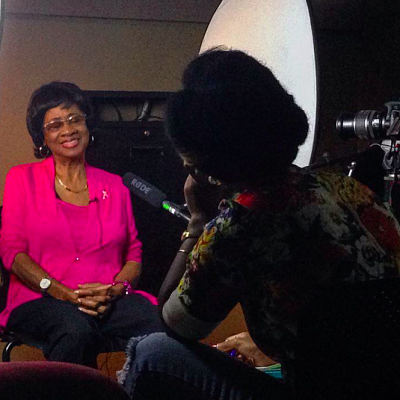Story by Richard Percy
Mohammad Alkhadher first got in touch with Laura Lo Forti through a Facebook group.
“The faculty and cohort are always sharing opportunities on there, and I've always been interested in the history of north Portland,” he says. “So when I saw that they needed help on a story about the founder of the Portland Black Panther Party, I was all-in.”
Alkhadher is a Multimedia Journalism Master’s student based in Portland who has been working with Lo Forti’s nonprofit, the Vanport Mosaic, ever since then.
Three years ago the University of Oregon SOJC partnered with the Vanport Mosaic to produce oral history videos that give voice to a forgotten population.
“As a former journalist, I’ve always been interested in how professionals can work with communities to tell stories in a more collaborative way, broadening the concept of ‘experts,’” said Lo Forti, Vanport Mosaic’s co-director.
“Since 2014, media producers, artists, historians, educators and families have been working together to document memories of those who lived in Vanport,” Lo Forti said, referencing a city that was once the second largest in Oregon.
Lo Forti, who affectionately calls herself a “story midwife,” has teamed up with Wes Pope, assistant professor and co-director of the SOJC’s Portland-based Multimedia Journalism Master’s program to create a participatory learning environment that aims to enrich his journalism students, her nonprofit and the greater Portland community they share.

Each fall, Pope devotes his Oral History and Media Production workshop to producing short videos that honor the survivors of the 1948 Vanport flood, giving them a platform to memorialize their untold stories. “His students work with community members trained through my project, sharing skills and knowledge,” said Lo Forti.
Alkhadher didn’t take the workshop last fall, but he still helped produce the videos and has remained a volunteer for the nonprofit. “Portland's a changing city, and I'm proud that I got to help Vanport Mosaic document a small piece of its history,” he said.
The videos produced during the workshop are screened to the public during an annual Vanport Festival, which had its inaugural run last year. “I honestly didn’t know what to expect,” said Lo Forti of last year’s turn out. “A four-day multidisciplinary festival during Memorial Day weekend to explore a piece of local history that is almost 70 years old, and it’s not even taught in school — it doesn’t sound such a good plan, does it? But our intuition was right.”
Over 2,000 people showed up. Events included performances of theater and poetry, tours of historical sites, an educational symposium with panels of speakers and a reunion of Vanport flood survivors. Lo Forti hosted three screenings of the videos that Pope’s class made during the oral history workshops, billed as “Lost City, Living Memories: Vanport Through the Voice of Its Residents.” Every screening was a standing-room-only event.
The 2017 Vanport Festival will take place May 26-29 in various venues throughout North Portland. This year it will also include a new feature to support the Agora Journalism Center’s Open: Housing initiative. The Vanport Mosaic and the SOJC have teamed up with Open Signal (formerly Portland Community Media) and the UO Historic Preservation Program to introduce a “story harvesting” experiment to the festival. A mobile recording studio will travel to different venues, where students will help community members record stories about home, displacement and belonging.
“This project started with a specific focus on the history of Vanport but has expanded to other little-known local histories,” Lo Forti said. “This past fall we have started capturing memories of life and activism in the black community in 1950s through 1970s.”
Vanport Mosaic collaborated with Oregon Black Pioneers, a nonprofit organization based in Salem, Oregon, that's working to develop an exhibit that will open at the Historical Society in January 2018. Some of the stories produced by Pope’s Multimedia Journalism Master's students will be screened in conjunction with the exhibit, called “Racing to Change: Oregon’s Civil Rights Years.”
Lo Forti said the primary mission of her organization’s partnership with the SOJC is to tell stories with impacted communities, not about them. This devotion to empathy and engagement extends beyond how stories are harvested to how they are shared with the community. Former Vanport residents, most of whom are now in their 70s or 80s, will be invited the festival to relive an important piece of Oregon’s history as well as their personal histories.
“When a person who thought she didn’t have a story worth telling gets to see a standing-room-only auditorium packed with hundreds of people there to learn about her life, laughing, crying and clapping in appreciation, there is a sense of validation and closure,” said Lo Forti. “We all benefit from gathering as a community to cherish these little-known stories, and to learn about chapters of the past that still influence city dynamics. It is an opportunity to make meaning together, to ask more questions and allow new perspectives to surface.”
Richard Percy will graduate this spring with a master’s in multimedia journalism. He is a Portland-based filmmaker and writer who develops story packages for the UO School of Journalism and Communications. View samples of his work at www.richardpercy.com.
